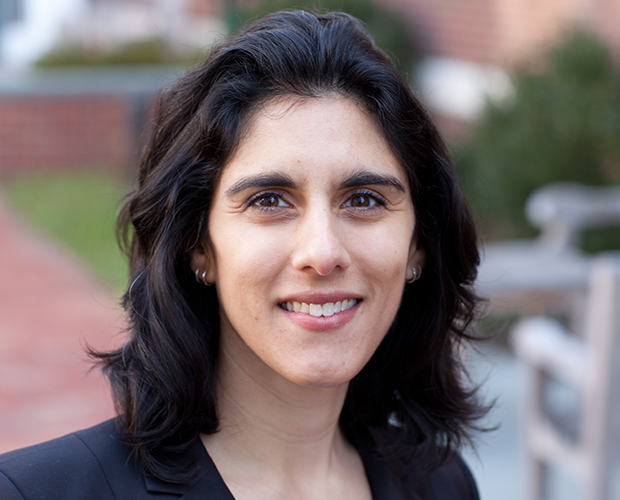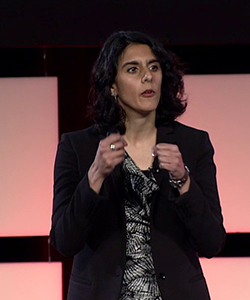Interdisciplinary research, from the brain up

Meet GPS’s new assistant professor, Uma Karmarkar, a neuroeconomist who looks at consumer behavior in theory driven-frameworks
Oct. 19, 2017 | By Rachel Hommel | GPS News
“My initial training was in neuroscience and I’ve always been interested in how the brain processes any kind of information, in part because it is ground zero…that’s where we start off from. It’s the machinery that lets us make all our choices,” said Uma Karmarkar, a newly minted assistant professor at the UC San Diego School of Global Policy and Strategy (GPS).
Starting with an undergraduate degree in symbolic systems, Karmarkar has always been interested in how people process information in the world around it. By combining theoretical disciplines throughout her career, Karmarkar’s work allows her to study both conscious and unconscious processes.
“Decision making can be a high level cognitive function with many inputs. I want to know how people take information and narrow it into a yes or no choice,” said Karmarkar. “The reason I decided to do so in a policy and business school was in part because these are the real-world decisions that are the hardest to grasp.”
Using methods from consumer psychology, behavioral economics and neuroimaging, Karmarkar looks at how people use favorable versus unfavorable information when making a decision, as well as how people prioritize their preference for a product over cost they have to pay.
“I’m interested in understanding how people get through their day with the number of choices they have to make. In addition, how do they relate or not relate to companies, and given those relationships, what kinds of responsibilities do companies, institutions and governments have in the way they communicate with individuals?” said Karmarkar.
Karmarkar added that it’s not about selecting one tool out of the experimental toolkit, it’s about recognizing that many domains of research have different takes on the same types of questions and that together they can help you build a bigger picture. She views the field of neuroeconomics as an inclusive one where the differences in findings are as revealing as the similarities.
Looking at how people use information to understand communication between customers and firms, her research looks at both situations where people have all the information they need, and situations with a lot of uncertainty. From studying the way information is presented to how the brain calculates value, neuroeconomics is at the core, bringing in multiple techniques when appropriate to give students a richer understanding.
“In a brain scanning study, the behavior in two kinds of decisions may look identical, but have a neural response that is different in meaningful ways. While that doesn’t necessarily tell you what the psychology is, that does tell you there is more going on under the surface than what is captured exclusively by behavior,” she added.
As someone who has actively pursued interdisciplinary research, her work fits into the framework of the GPS toolbox model, and she indicated she is excited to broaden the scope beyond the marketplace and throughout policy.
 Impressed by the breadth and depth of GPS, Karmarkar looks forward to collaborations with a variety of professors, including Roger Bohn, Liz Lyons and Ulrike Schaede, all who look at research within the business domain.
Impressed by the breadth and depth of GPS, Karmarkar looks forward to collaborations with a variety of professors, including Roger Bohn, Liz Lyons and Ulrike Schaede, all who look at research within the business domain.
“I feel really lucky to have that opportunity to increase the potential impact of the research I’m doing on important problems,” said Karmarkar. “The richness of the faculty is amazing. It’s an extraordinary collection of scholars.”
Jointly appointed at both GPS and Rady School of Management, Karmarkar stresses the importance of being positioned in the global economy. She will be teaching as part of the management track at GPS and teaching a marketing class in winter 2018.
“We are at a point where corporations are so large and so integrated into people’s lives, it is very difficult to say that business practice isn’t policy,” said Karmarkar.
With a teaching background in case method instruction, which promotes engagement and conversation, Karmarkar wants her students to be actively involved. With business policy, there is no right answer, stressing that the process of making decisions is more important than understanding previous decisions.
“If the students are not actively discussing or arguing the ideas, then I have not achieved what I want,” she said, smiling.
3 questions with Assistant Professor Uma Karmarkar
What is your academic focus?
I look at how people integrate the information around them to make economic decisions, particularly in uncertain situations.
What are the real-world impacts of your research?
By understanding the mechanisms underlying marketplace decision-making, we can help people make confident and informed decisions. We can also develop better ways for companies and other institutions to offer more useful information to their customers.
What skills or understanding do you hope students leave your class with?
There are very few “right” answers in business policy, and even fewer that generalize across communities and markets. I hope students will leave my class having mastered flexible tools and frameworks to dynamically build the best strategies for the specific markets in question. I also hope they will have developed understanding of how to evaluate a situation from the perspective of both institutions and individuals.

